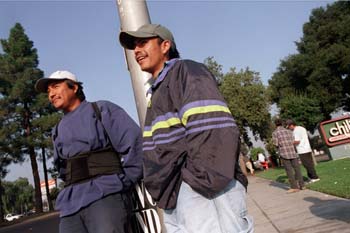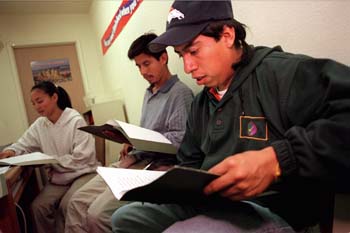![[Metroactive News&Issues]](/gifs/news468.gif)
[ San Jose | Metroactive Central | Archives ]
 George Sakkestad Ready and Willing: Day workers in search of employment line the Mountain View side of El Camino Real now that Los Altos has a 'no vehicle solicitation' ordinance. Border Crossing Los Altos didn't like the look of day workers on El Camino Real, so the council passed an ordinance--exporting the problem to Mountain View. Now Mountain View is considering an ordinance of its own. But who's going to solve the problem? By Will Harper ON THE NORTH SIDE of El Camino Real between Showers and San Antonio at 8am, dozens of Mexican men of all ages--from teenagers with peach-fuzz mustaches to grandfathers with gray hair peeking out from under their baseball caps--are standing around, waiting for a car to pull over. The waiting can go on for hours. One man from San Jose says he has been here since 6:30am waiting for a patron, or boss, who promised to meet him in Mountain View today on this busy commercial block near Fresh Choice to do another day job. But the patron never showed. Down the block, in the parking lot in front of Bueno Bueno Burritoria a blue sedan pulls in and 10 men immediately swarm around it, hoping to get a landscaping, construction or other odd job for the day. The pay varies from job to job, but it averages $50 to $60 a day, a few nearby work-seekers say. According to a survey done by St. Joseph the Worker Center, employers come from as far away as Fremont, although most hail from Los Altos, Mountain View and nearby Palo Alto. A man named Silverio standing near the bus stop in front of Hollywood Video tells me that he usually finds work two to three days a week, enough to cover his $200-a-month rent and send some money back home to his wife and three kids in Oaxaca. Silverio, who lives in a nearby apartment, is a young-looking 38 with a slim build and a slim mustache. He wears a black baseball cap with a silver bill, a black hooded sweatshirt and black jeans. He has been coming to this part of El Camino for the past year or so. Sometimes he used to wait for work across the street on the other side of El Camino, the Los Altos side. But not anymore. Of the merchants on the other side of the street, he says, "Son mas delicados," which means that they are more sensitive or uptight than those on the Mountain View side. "The police chase us away from that side," another man interjects. Three weeks earlier, "No vehicle solicitation zone" signs in English and Spanish popped up on the Los Altos side of the block. Los Altos police--none of whom speak Spanish--walked the block handing out bilingual fliers warning job-seekers about the new law, which makes it illegal to solicit work from a vehicle on El Camino between San Antonio and Showers roads. The impact was immediate, merchants and police say. "It's like night and day. There's nobody out here anymore," cheers chiropractor David Vik, whose Los Altos office is in the middle of the "no solicitation zone." Vik recalls that before the ordinance clients would sometimes pull into the parking lot and all of a sudden be surrounded by a dozen men who had mistaken them for potential employers. "A lot of my clients got frazzled and would just jet," he says, "and not come back." The repeated gripes from El Camino business owners like Vik, who complained that the day workers were scaring away customers, ultimately motivated the Los Altos City Council to pass an anti-solicitation ordinance in July, though it didn't take effect until Sept. 27. Los Altos police Capt. Cliff Balch says that no $80 citations have been issued yet, in part because there is no one on the street to cite. "Interestingly enough," Balch says, "the problem virtually disappeared the very first day the ordinance went into effect." Well, not exactly disappeared. It just went across the street into Mountain View.
THREE BLOCKS from the "no solicitation zone" in a cramped walk-up suite above the Big & Tall clothing store, Sumi Kamiya of St. Joseph the Worker Center is teaching her English class. The center was started in 1996, with the financial help of El Camino Hospital, to deal with the day-worker dilemma. Aside from English classes, the center attempts to match immigrant workers with day jobs, an attempt to bring the transaction that now takes place on the street into a more orderly indoor setting. The classroom has a maximum capacity of 30 people, and today it's nearly full, as it is every day. An average of 50 people come each day looking for work, though the number can go up to 70. On the wall a handwritten sign posts such helpful phrases as "Please speak slowly" and "Please repeat that." "Who," Kamiya instructs her pupils to repeat. "Who," they respond in owl-like unison, some scribbling in notebooks. Soon it is time for a spelling test. First word: "Grandparents." In the front office adjacent to the classroom, caseworker Estela Arce, seated behind her desk, is getting personal information from a newcomer to the center, who wears black work boots with white paint splattered over them. It's Arce's job to match workers with employers and negotiate the pay rate, which ranges from $8 to $15 an hour, depending on whether a laborer has any special skills. "Do you speak English?" Arce asks. "More or less," the newcomer replies in Spanish. Since the Los Altos anti-solicitation law went into effect, she says, "there has been a little bit more people coming now," though hardly a tidal wave. The center's executive director, Elizabeth Fitting, says that in the month of September 1,551 people came to the center looking for work; 506 of them were placed in jobs. For the past few months, Fitting has been desperately looking for bigger quarters so the center can handle more workers coming through the doors. So far, Fitting says, she has looked at more than 80 different sites with no luck. In some cases, the rents have been too high to fit in the center's $150,000 annual budget; in other cases, zoning restrictions got in the way. "We found a couple of places that might have worked," she sighs, "but the landlords wouldn't even talk to us." Back in July when the Los Altos City Council passed its anti-solicitation law--modeled after a 1997 San Jose ordinance--the Mountain View City Council balked at going ahead with its own ordinance. Mountain View officials wanted to give St. Joseph's more time to find a bigger space so once a law went into effect authorities could give job-seekers on El Camino a viable off-street alternative. "We want to solve the problem," reasons Mountain View Councilwoman Nancy Noe, "not just move it [to another street]." But Los Altos' elected leaders thought that they had waited long enough. A joint task force comprising officials from Los Altos and Mountain View had spent months studying the day-worker issue. The task force recommended earlier this year that both cities enact a solicitation ordinance to get day workers off El Camino. Besides, argues Los Altos Councilwoman Kris Casto, who is up for reelection next month, it's not as if the city was hastily responding to a brand-new problem. Sources say day workers started appearing in the area in the early '90s at a time when there was a lot of building and remodeling going on in Los Altos. "I think four to six years of these people standing in front of our businesses has been enough," Casto says, adding that prospective merchants have been reluctant to locate in the area because they fear day workers will scare away business. The fliers being handed out to day workers by Los Altos police encourage laborers to seek jobs at St. Joseph's. But many workers--once they realized that Mountain View didn't have a law--just crossed the street instead of going to the job center. "It's very small there," Silverio, the 38-year-old laborer from Oaxaca, says of St. Joseph's while he waits on the Mountain View side of El Camino for a car to stop and offer work. "I have better luck out here." Though the numbers fluctuate, Mountain View police spokesman Jim Bennett estimates that up to twice as many workers now stand on the Mountain View side of El Camino as did just a month ago before Los Altos' law went into effect. THE INFLUX OF WORKERS is making some Mountain View business owners increasingly impatient as city officials bide their time. Tom Rees owns the six-story office building at 2570 W. El Camino occupied by lawyers, dot-com companies, investors and medical researchers. He says that the number of workers now hanging out on his side of the street has doubled, or possibly even tripled, in the past month. Building tenants complain about things like men urinating in the parking lot or leaving behind empty bottles of booze. For Rees, though, the major issue is safety--for both his tenants and the workers. "Sometimes when you try and pull in [the parking lot] off the street," he says, "guys will be blocking the driveway and you can't pull in. Meanwhile, people on El Camino going 60 miles an hour nearly rear-end you. It's not a good situation." Rees wants the Mountain View City Council to pass an ordinance like the one in Los Altos right away--whether or not St. Joseph's finds a new, larger site. "When it comes to the safety of its streets," Rees argues, "I don't think the city has any choice [but to pass a law]." Rees just might get his wish. Mountain View officials are now talking like a Los Altos-like law is inevitable. "We have already delayed [passing a law] for a long time," says Mountain View Mayor Mary Lou Zoglin. "We may come to the point where we have to say, 'Let's give [an ordinance] a try' even if the St. Joseph the Worker Center can't find a larger home in the area. "Ideally," she adds, "we'd like a much larger place, but if it can't be found, we need to see what we can do to make it so the current location can serve more people." "Our initial thought," says Councilwoman Nancy Noe, "was to enact an ordinance" after the worker center found a bigger place. "Unfortunately," Noe concludes, "that part isn't coming together." The Mountain View City Council's neighborhoods subcommittee--which includes both Zoglin and Noe--is reviewing a draft version of an anti-solicitation ordinance this week. Noe and Councilwoman Sally Lieber, another member of the subcommittee, say they want enforcement of an ordinance to focus on the drive-by employers, not the workers. Doing so, Lieber hopes, will get contractors--whom she describes as the real repeat offenders in the situation--to go to the worker center instead of the streets. "We've felt all along," Lieber says, "that the day workers will go wherever the contractors are." [ San Jose | Metroactive Central | Archives ]
|
From the October 28-November 3, 1999 issue of Metro, Silicon Valley's Weekly Newspaper.
Copyright © 1999 Metro Publishing Inc. Metroactive is affiliated with the Boulevards Network.
For more information about the San Jose/Silicon Valley area, visit sanjose.com.
